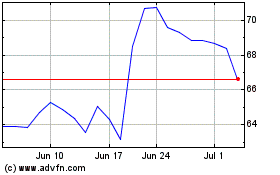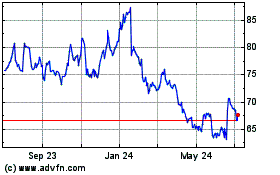UPDATE: Intermune Soars On FDA Panel, Buyout Speculation
March 10 2010 - 1:50PM
Dow Jones News
InterMune Inc. (ITMN) shares surged Wednesday to eight-year
highs after a panel recommended that the Food and Drug
Administration approve its lung-disease treatment.
The panel's support Tuesday greatly increases the chances for
ultimate approval, which would produce a valuable asset in a niche
disease area, something Wall Street expects will attract acquirers
to the company.
The Brisbane, Calif., drug developer is seeking FDA approval for
pirfenidone, which was developed to treat a lung condition known as
idiopathic pulmonary fibrosis, the thickening and scarring of lung
tissue.
The FDA is expected to issue its final decision by early May,
although the FDA isn't bound by the panel's ruling and questions
remain about the strength of the drug's data.
Nonetheless, the rise in InterMune shares--which have nearly
tripled since the end of last week--reflects how much FDA approval
of pirfenidone, also known by its proposed brand name Esbriet,
would transform the company. Intermune would have its first product
on the market, for which it owns all the rights, in an area with
little competition and the potential to garner sales of more than a
billion dollars a year.
Those prospects make Intermune a potential takeover candidate,
especially by large drug makers with struggling pipelines and
facing generic competition on key drugs.
In a conference call Tuesday, InterMune declined to comment on
any takeover speculation but said it would be obligated to consider
any proposal that offers shareholders greater value than company's
own strategic plan.
Intermune shares recently rose 64% to $38.25. The stock's high
Wednesday was $39.50, its best mark since February 2002. It's been
a rapid rise for the stock, which traded at $14.41 as recently as
Thursday. The stock jumped 59% Friday after briefing documents for
the FDA panel meeting were viewed positively by investors.
Analysts now are projecting annual sales of the drug to
eventually exceed $1 billion. Much of that would be driven by a
price estimated to be more than $50,000 a year per patient.
That type of pricing power in such orphan-type drugs, which
serve rare diseases, has become more attractive to larger
companies. The drugs are also given longer exclusivity
periods--seven years in the U.S. and 10 years in Europe--to
encourage their development.
For pirfenidone, that protection will be important as its major
patent protection has expired, something that would be heavily
considered by potential acquirers.
Analyst Brian Abrahams from Oppenheimer & Co. names Gilead
Sciences Inc. (GILD) as an obvious fit for InterMune, because the
larger HIV-focused company has made a push into respiratory disease
and is developing Hepatitis C drugs, something that is in
InterMune's pipeline.
He also mentioned Roche Holding AG (RHHBY, ROG.VX) as
potentially interested in InterMune to add to its own respiratory
business. The companies are partnered to develop those hepatitis
drugs together.
Spokesmen for Gilead and Roche declined to comment.
Interestingly, InterMune Chief Executive Dan Welch previously
served in the same position at Triangle Pharmaceuticals, which
Gilead acquired in 2003 for $464 million. Triangle developed HIV
drug Emtriva, a component of the combination treatments Truvada and
Atripla. The two drugs had combined 2009 sales of almost $5
billion.
ThinkEquity analyst Brian Skorney believes a deal is likely, but
he thinks that such takeover talk for InterMune is a bit too early,
as several hurdles remain before a large takeout premium would be
considered by larger companies.
He said InterMune shareholders would likely resist such a bid
now, which would be viewed as "trying to steal the company," as FDA
approval, pricing information and other developments will only add
more value. Plus, pharmaceutical companies seem content to wait to
see how the drug performs in the market.
Idiopathic Pulmonary Fibrosis involves the scarring of the
lungs, often from an unknown cause, which makes it hard for the
oxygen to enter the blood. About 200,000 Americans have the
condition, with about 50,000 new cases every year, according to the
National Institutes of Health. It mostly affects people between 50
and 75 years old, and patients generally live three to five years
after diagnosis.
-By Thomas Gryta, Dow Jones Newswires; 212-416-2169;
thomas.gryta@dowjones.com
Gilead Sciences (NASDAQ:GILD)
Historical Stock Chart
From Jun 2024 to Jul 2024

Gilead Sciences (NASDAQ:GILD)
Historical Stock Chart
From Jul 2023 to Jul 2024
